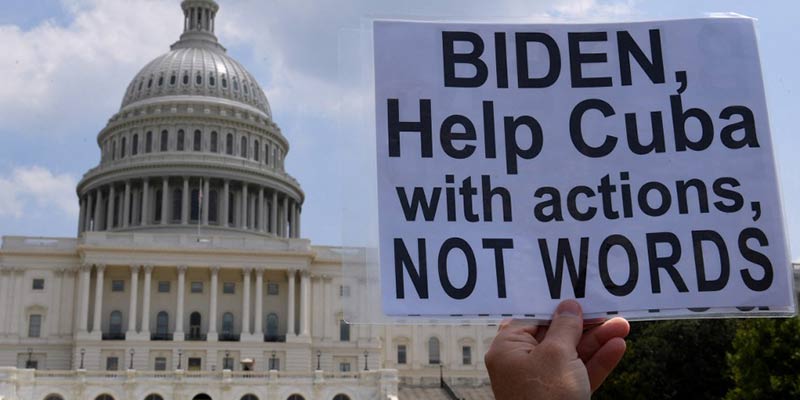- World
- Nov 03
Explainer - US embargo against Cuba
The UN General Assembly on November 2 voted by a large margin against the United States’ economic and trade embargo against Cuba.
A total of 187 States voted for the resolution put forward each year against the embargo with only the US and Israel voting against and Ukraine abstaining.
Six decades of the embargo
• The United States maintains a comprehensive economic embargo on Cuba.
• The embargo is rooted in the Cold War, when Fidel Castro and his revolutionaries seized power in Cuba in January 1959.
• US President Dwight D. Eisenhower’s State Department imposed the first trade embargo on Cuba in October 1960.
• In February 1962, President John F. Kennedy proclaimed an embargo on trade between the US and Cuba, in response to certain actions taken by the Cuban government, and directed the Departments of Commerce and the Treasury to implement the embargo, which remains in place today.
• The embargo imposed by the US against Cuba is one of the longest in modern history.
• The economic, commercial and financial embargo is defined by a series of US laws that have been enacted over several decades.
• In 1992, the Cuban Democracy Act was adopted, which gave legislative force to all embargo regulations. This Act, also known as the Torricelli Act, prohibits not only US companies, but also their subsidiaries in third countries, from trading with Cuban companies. In addition, it prohibits any merchant ship from entering US territories until six months have elapsed since it last docked in Cuban ports, creating significant difficulties for Cuban maritime trade.
• During the term of office of President Bill Clinton, the Cuban Liberty and Democratic Solidarity (LIBERTAD) Act of 1996, generally known as Helms-Burton Act, was adopted, which established, sanctions for directors of foreign companies that conduct transactions involving US property that was nationalised in Cuba, and contains provisions for the filing of cases in US courts, fostering internal subversion.
• Tensions only eased more than a half-century later when the Obama administration established diplomatic relations with Cuba, modifying several aspects of the embargo, such as lifting some travel restrictions. The first steps included the re-opening of embassies and the removal of Cuba from the list of State sponsors of terrorism. Direct mail services between the two countries were restored. Regular direct flights between the two countries were re-established.
• President Obama’s amendments to the regulations on the application of the embargo and his position in favour of eliminating the policy were drastically reversed by the Trump administration.
• However, the US sanctions include exemptions and authorisations relating to the exports of food, medicine, and other humanitarian goods to Cuba. The US remains a significant source of humanitarian goods to the Cuban people.
• Biden has eased some sanctions on Cuba implemented by his predecessor, Donald Trump, loosening tough US restrictions around remittances, flights, tourism, and migration.
Negative effects on the Cuban economy
• The embargo has a negative impact in all economic, social and cultural areas, severely limiting the right to development of Cuba.
• The “blockade”, as it is known in Cuba, has made things more difficult and more expensive for the average Cuban.
• Six decades of the embargo has cost Cuba trillions of dollars. During the first 14 months of the Biden administration, the damage to the Cuban economy was estimated at $6.35 billion.
• The embargo has had significant negative effects on the Cuban economy and on the standard of living of Cuban citizens.
• Until 1962, Cuba was the natural market for the purchase by the US of cigars and of leaf tobacco for the US tobacco industry.
• The embargo maintains restrictions on the use of the US dollar and restrictions relating to imports from Cuba. The embargo affects opportunities for national and local development and creates economic hardship for the population. It has an impact on the population’s most vulnerable groups, and on human development in general.
• The public health sector has suffered losses as a result of the inability to purchase, from US markets, medicines, reagents, spare parts for diagnostic and treatment equipment, medical instruments and other supplies necessary for this sector.
• In the food and agriculture sector the damage is reflected in higher prices for agricultural seed, fertilisers, spare parts for agricultural equipment and other inputs on the geographically distant markets where they must be purchased as they cannot be purchased from the US market.
• The tourism industry in Cuba has also reported substantial damage as a result of the limitations and prohibitions caused by the embargo.
Voting in the UN General Assembly
• The vast majority of countries at the UN General Assembly have expressed their opposition to the embargo.
• Since 1992, every year votes have been held without interruption, and a broad majority of countries have expressed their opposition to this aggression against the Cuban people.
• Only the US, Israel and some other allies, never more than four countries, have opposed this comprehensive condemnation.
Manorama Yearbook app is now available on Google Play Store and iOS App Store


